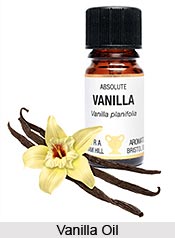 Vanilla is commonly available as an oleoresin and occasionally as an essential oil. Vanilla oil is extracted from "Vanilla Planifolia" of the Orchidaceae family and is also known as common vanilla. Most of the flavors that include "vanilla" are not actually derived from proper vanilla at all. They are synthesized from hydrocarbons. The odour is a relaxant for stress, anger, and tension, and it can be added to a blend for aphrodisiac effect for tense lovers.
Vanilla is commonly available as an oleoresin and occasionally as an essential oil. Vanilla oil is extracted from "Vanilla Planifolia" of the Orchidaceae family and is also known as common vanilla. Most of the flavors that include "vanilla" are not actually derived from proper vanilla at all. They are synthesized from hydrocarbons. The odour is a relaxant for stress, anger, and tension, and it can be added to a blend for aphrodisiac effect for tense lovers.
Origin of Vanilla Oil
The word "vanilla" comes from the Spanish word "vainilla" which means little black pod. Vanilla is indigenous to Central America and Mexico, but has been widely grown in the subtropics of Asia, Northern Europe, and Canada. Madagascar is the largest producer of vanilla in the world. It is a perennial herbaceous climbing vine that can grow up to 25m high and is native to Central America and Mexico.
In cultivation, the deep trumpet-shaped flowers of the plant must be hand-pollinated, but in Mexico the native humming bird does the work.
Extraction of Vanilla Oil
The Oil of Vanilla is extracted by solvent extraction of a resinous substance obtained from fermented vanilla beans. These beans come from vanilla plants, a creeper that grows mainly in Mexico and neighbouring countries. The green capsules or fruit are picked and "cured" and the immature Vanilla pod or bean is fermented and dried to turn it into a fragrant brown vanilla bean.
Health Benefits of Vanilla Oil
Beyond its fantastic aroma and delicious flavor, vanilla oil boasts of a variety of health-promoting properties. The health benefits of Vanilla Oil can be attributed to its properties as an antispasmodic, balsamic, calming, emenagogue, antioxidant, aphrodisiac, anticarcinogenic, febrifuge, antidepressant, sedative, tranquilizing and relaxing substance.
•Fight some types of cancers
•Regulate menstruation
•Relieve nausea
•Ease stress, anxiety, depression, and insomnia
•Heal wounds
•Enhance your libido
•Induce sleep and encourage dreaming
Vanilla oil can also work as a fever reducer due to its eugenol and vanillin content, the same compounds that lessen inflammation and strengthen the body"s immune system.
Vanilla oil is usually directed for topical applications to soothe burns, promote healthy skin, encourage hair growth, and as a massage oil to reduce muscle or joint pain. Vanilla oil also has a range of positive effects when used in aromatherapy. Vanilla oil has been particularly found to be useful in improving one"s emotional and physiological health and well-being, especially when used in aromatherapy.
Uses of Vanilla Oil
•Vanilla oil is used as a flavouring agent in pharmaceutical products.
•It is used in food and in tobacco.
•It is also an ingredient in some oriental type perfumes.
•Stimulates sexual arousal.
•Stimulates menstruations.
Apart from its widespread use as a flavoring agent in certain organic foods, beverages and pharmaceutical industries as well as in culinary endeavors, the oil of vanilla has found extensive use in the world of medicine as well. Vanilla oil is used as a flavoring agent in pharmaceutical products, in food and in tobacco and is also an ingredient in some oriental type perfumes.
Blending: The vanilla oil blends well with the oils of Orange, Lemon, Neroli, Jojoba, Chamomile, Lavender, Vetiver, Spice Oils, Bergamot, Rose and Sandal Wood.




















